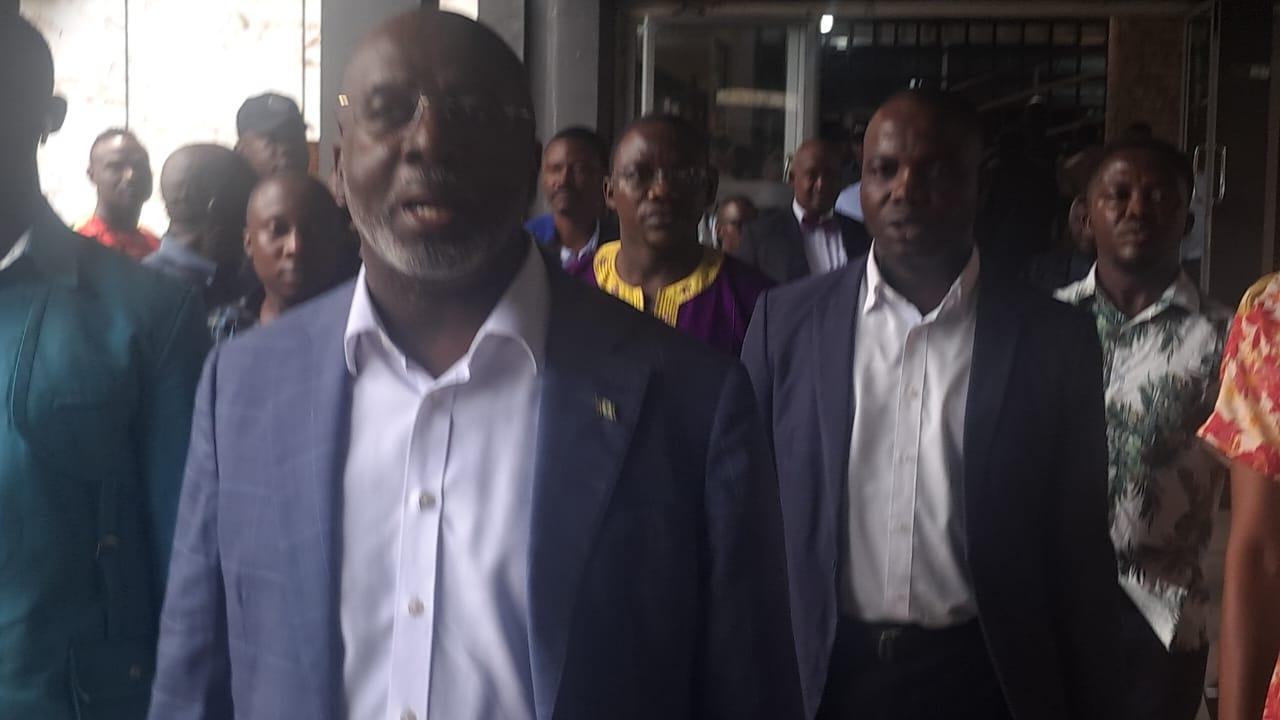Africa-Press – Liberia. Court “A” Judge Roosevelt Willie is expected to rule next Wednesday, September 24, 2025 on a defense motion seeking an independent medical examination of former House Speaker Cllr. J. Fonati Koffa and his co-defendants, who are on trial for allegedly orchestrating an arson attack on government property.
The defense is claiming that the defendants, currently held at Monrovia Central Prison, were subjected to severe physical abuse, sodomy and psychological torture while in state custody.
To substantiate these allegations, the defense filed a motion requesting an independent medical evaluation.
However, the process has been marred by delay and disagreement.
Judge Willie initially ordered that the examination be conducted at the John F. Kennedy Medical Center (JFK), but the defense team rejected the assignment, citing the facility’s status as a government-run hospital, which they argued compromise its neutrality.
In a later response, the judge granted a second option from the defense, this time, approving AMI Expeditionary Medical Healthcare Center to conduct the examinations.
The Ministry of Justice was instructed to cover all associated costs and the defendants were to be escorted by judicial security.
The results of those examinations were due to the court Wednesday, September 17, allowing Judge Willie to finally rule on next Wednesday, September 24 on whether an independent medical review is warranted and, if so, how its findings might affect the admissibility of the prosecution’s evidence.
“The ruling on the medical examination is procedural but essential,” said a court observer.
“It’s the gateway to the suppression motion, which could fundamentally alter the state’s case.”
Judge Previously Fined Defense Lawyers
The path to next Wednesday, September 24 ruling has not been smooth.
On Wednesday, September 10, Judge Willie imposed US$100 fines on defense lawyers Cllr. Arthur Johnson, Cllr. Wilkins Wright, Cllr. Jonathan Massaquoi and Cllr. James Kumeh, accusing them of advising their clients not to comply with the court’s original order to appear at JFK for examination.
The court cited a report from the Superintendent of Monrovia Central Prison, which indicated that the defendants refused the exam on their lawyers’ advice.
“The court gave a clear and lawful order. It must be obeyed or challenged through the Supreme Court, not disregarded,” Judge Willie stated. “Disobedience threatens the integrity of the judiciary.”
The defense, however, contested the fines, arguing that the refusal came from the defendants themselves, not counsel, and also questioned the legal standing of the prison superintendent’s report, which they claimed was not verified through testimony.
Defense Raises Concerns About AMI Facility
While the court accepted the defense’s request to avoid JFK, the substitution of AMI has also come under fire.
Cllr. Wilkins Wright argued that AMI, despite being presented as an independent facility, has existing contracts with the Ministry of Justice and Liberia National Police, thereby compromising its independence.
He cited a previous incident involving co-defendant Kendrich Koffa, who was allegedly assaulted in custody, but whose AMI-issued medical report listed malaria as the diagnosis, raising doubts about the facility’s impartiality.
Nonetheless, Judge Willie maintained that AMI was a suitable venue, stating that any objections to its findings could be challenged in higher courts.
“No party has the right to ignore a lawful order of this court,” he reiterated. “Justice must be pursued within the framework of the law.”
Prosecution Accuses Defense of Deliberate Delays
Meanwhile, the prosecution, led by Cllr. Richard Scott, accused the defense of engaging in deliberate delay tactics to prevent the suppression ruling from moving forward.
“The defense has received multiple accommodations, yet continues to obstruct the process,” Scott argued. “They are using procedural technicalities to avoid the real issues of the case.
Scott insisted that the only remaining basis for the suppression motion was the torture allegation, and by refusing to undergo the medical examination, the defense was strategically attempting to stall the court’s decision.
TWo Critical Rulings on the Line
The ruling on the motion for medical examination is not just procedural, it is the final hurdle before the court can address the central question on whether evidence presented by the prosecution should be thrown out on grounds that it was obtained illegally.
If the court rules in favor of the medical examination and accepts the findings, it could backed the defense’s claim of coercion and abuse.
If the court denies the motion or finds the evidence admissible, the prosecution’s case moves forward with a heavy weight. This case, involving a high-profile political figure, has drawn intense public scrutiny and raised broader concerns about detainee rights, judicial authority, and due process in Liberia.
With next Wednesday’s ruling expected to determine the next steps in the trial, all eyes remain on Judge Willie and Criminal Court “A” where the legal battle continues to unfold with national implications.
For More News And Analysis About Liberia Follow Africa-Press






